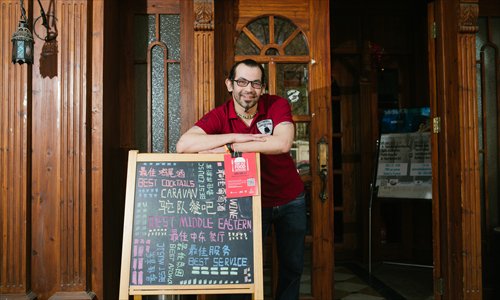Foreign foodies jostle for a slice of Beijing’s sizzling restaurant scene

Sometimes Sanlitun eatery Mosto grows so busy that Alex Molina, the general manager of the Mosto Group, makes a guest appearance as a waiter. Photo: Li Hao/GT
When 33-year-old London native Hannah Oussedik first visited Beijing more than 10 years ago, the city's international dining scene was - well, not much to get excited about. "There were only maybe three or five foreign restaurants," she remembers. "There weren't a lot of options."
A decade later though, Oussedik, along with Beijing's other self-designated foodies, finds herself with more than enough on her plate. "Now, you can go to all kinds of restaurants - British, Italian, everything."
And it's not just foreigners taking advantage of the expanded options. "Before, foreign restaurants were filled only with foreigners, but now you see a lot of very sophisticated Chinese customers, many of whom have spent time or studied abroad."
With a vibrant restaurant scene that boasts everything from British pub food to South African wine bars to European fine dining, Beijing has transformed itself into a hub for culinary innovation.
The biggest motor of this transformation has been Beijing's foreign community - specifically foreign restaurateurs, who in recent years have clamored to open eateries aimed not only at their fellow expats, but at the city's growing number of curious, savvy Chinese diners.
"The Chinese market for authentic, quality Western food is steadily growing," says Wilson Hailey, the owner of Rager Pie, a pie and specialty coffee shop nestled in the hutong of Gulou. His own restaurant is a case in point: Despite its somewhat cramped interior and out-of-the-way locale, since opening in 2015, Rager has built up a solid customer base of both Chinese and foreigners. The restaurant is far from flash, but what it does offer is an expanding menu of authentic eats and some of the best coffee in town.
"You can still find overpriced, overrated restaurants, but that model tends to lose out as consumer sophistication increases," said Hailey.

Badr Benjelloun in front of Caravan, a Moroccan restaurant near Jianguomen that combines food, drinks and music. Photo: Li Hao/GT
Beijing's growing international dining market
Among Oussedik's favorite regular spots is Mosto in Sanlitun, which serves contemporary international cuisine with a South American twist, with dishes like beef tenderloin, saffron risotto and salmon sashimi.
"They are very consistent," she says. "If you go there after six months, you'll still have the same experience with the same level of detail."
According to Alex Molina, general manager of the Mosto Group, restaurateurs have found growing space for development as the Beijing market matures. Since Mosto first opened in 2008, it's continued to expand, and now boasts five locations across the city.
Despite their devoted expat following, Molina, who has 20 years of experience in the food industry, says their main target is Chinese customers. "Sixty percent of our customers are Chinese," he said. "We hope to get the ratio of Chinese customers to over 95 percent."
That's no slight against foreign customers. According to Kristen Lum, founder of the popular Beijing food blog lumdimsum.com, a solid Chinese clientele is essential for many restaurants to achieve stability.
"While Western restaurant owners are happy to have foreigners as regular customers, their ultimate goal is to have more Chinese regulars for a steady stream of business," she says. "The international restaurant scene in Beijing is still quite fickle. While there are plenty of new concepts popping up often, there are just as many that close their doors."
Lucky for new restaurant owners, Lum says that Chinese diners are becoming increasingly adventurous, with more and more willing to try out new Western restaurants. While she says foreigners used to be the first to explore newly opened eateries, that's starting to change thanks to apps like WeChat and Dianping, the largest consumer rating site in China.
Facing fierce competition and challenges
Although - or perhaps because - Beijing's growing restaurant market offers an abundance of opportunities, the competition in recent years has grown increasingly fierce.
"Some people might think that if they are a foodie and they have a lot of friends, they can easily open a restaurant in Beijing, but it is not the truth," says Molina.
It's no longer just foreigners with a few bucks and a dream opening restaurants; these days, Molina says, Beijing has begun attracting high-level chefs and restaurant managers from all over the world.
Another challenge for foreign restaurateurs is one that will be familiar to business owners in every big city in the world: location, location, location. For long-time expat Badr Benjelloun, who owns the sports bar Cuju and Moroccan restaurant Caravan, location has been one of the most vexing parts of opening his own restaurants.
Benjelloun learned this the hard way two years ago with his short-lived bar/restaurant Daze, the predecessor to Caravan.
It wasn't long after their opening that Benjelloun discovered that their landlord had failed to reveal that the space was residential, which meant they'd be unable to obtain a business license. In the end, their landlord broke the contract and insisted that they leave.
"[These are] basically the classic problems that we all encounter in this field," Benjelloun says. "Other failures are more related to products and promotions that are not popular, but we keep changing things until we find what works for us."
Another challenge can be finding reliable sources of ingredients. "Now people are more concerned about food safety. So safe and good quality produce are very important for us," said Benjelloun.
Preserved lemons, for example, are essential to Moroccan cuisine, and though they're available on every street corner in Morocco, they're harder to find in Beijing. Benjelloun's solution? He makes them himself. "Each batch takes about six weeks to be ready, but there is no other choice in order to achieve the taste we need and are looking for."
Finding an identity in niche markets
Although tasty, authentic cuisine is key, it alone isn't enough to guarantee success in Beijing's cut-throat restaurant market. Almost as important is establishing a character and a concept that people can get behind.
When Benjelloun was brainstorming Caravan, for example, he first did an analysis of the market before deciding to open a place that put food, drinks and music all under the same roof. "I saw that there were many livehouses, restaurants and bars, but few places where you can get all three at the same time," he said.
Location was also part of his strategy. With both Cuju and Caravan, Benjelloun sought out locations that weren't too crowded, but also not too out of the way.
"I focus on niche markets where the competition is generally lower," he says. "In other areas, let's say Sanlitun, you do have more visibility and more traffic, but the competition is also fierce. As a sole business owner, I try to stay away from areas where there are many international establishments with big investment funds. We just can't compete against them and their prices."
According to Lum, Beijing has begun seeing more places zeroing in on niche markets, which has proven a boon for diners.
"Rather than trying to do everything, people are figuring out that it's better to do less things really, really well," said Lum.
Three recent examples, she says, are the popular eateries The Taco Bar, Bottega and Palms L.A., which focus on tacos, Neapolitan pizza and Korean-Mexican fare respectively. "Each of the three concepts are successful and I think it's because they are so specific and focused on what they do."
Growing collaborations and experimentation
While you might think that growing competition in Beijing's dining scene would have a cooling effect on relations between restaurants, according to Hailey, that isn't the case.
"Competition can be fierce, but for the most part, the F&B (Food &Beverage) industry in Beijing is a tight-knit one," he said.
Over the past couple years, those chummy relationships have even blossomed into some fruitful collaborations. "Since Beijing's dining scene is still constantly developing and evolving, I see a lot of restaurants collaborating on various pop-ups or kitchen takeovers. It's awesome," said Lum.
Last year, for instance, Mosto teamed up with sushi restaurant Hatsune to host a pop-up dinner featuring Peruvian and Japanese influences. It was Mosto's first time trying such a project, and it received positive feedback.
"The food industry in Beijing is very tight-knit," Molina says. "People are always willing to help each other out, such as sharing good or bad suppliers, and are open to different, new ideas."
This culture of experimentation has even led to the emergence of several culinary incubators, or companies dedicating to helping startup restaurants develop by providing resources. Beijing-based incubator ChefShow, for instance, helped get establishments like French-Asian fusion restaurant JOMI off the ground. More recently, the first foreign-run incubator, Hatchery, which is also a restaurant serving contemporary fusion cuisine, opened in the Tuanjiehu area. Hatchery's co-founder, Alex Worker, says that their goal is to help launch more creative F&B products and concepts in Beijing by helping food entrepreneurs develop their ideas.
This takes place in the Hatchery kitchen and dining room, where chefs get to test out their ideas on real live consumers, and get first-hand feedback. This kind of real-time response is key to nurturing any successful F&B idea, he said.
"Everybody is traveling domestically and internationally a lot more. This means people know what a good burger tastes like, just like a good roujiamo (a Shaanxi-style burger)," he said. "Whilst there will always be people willing to pay a lot for high-end quality, we see the real opportunity as being catering to China's growing millennial consumers, who want everyday quality at everyday prices."
Newspaper headline: A taste of the West